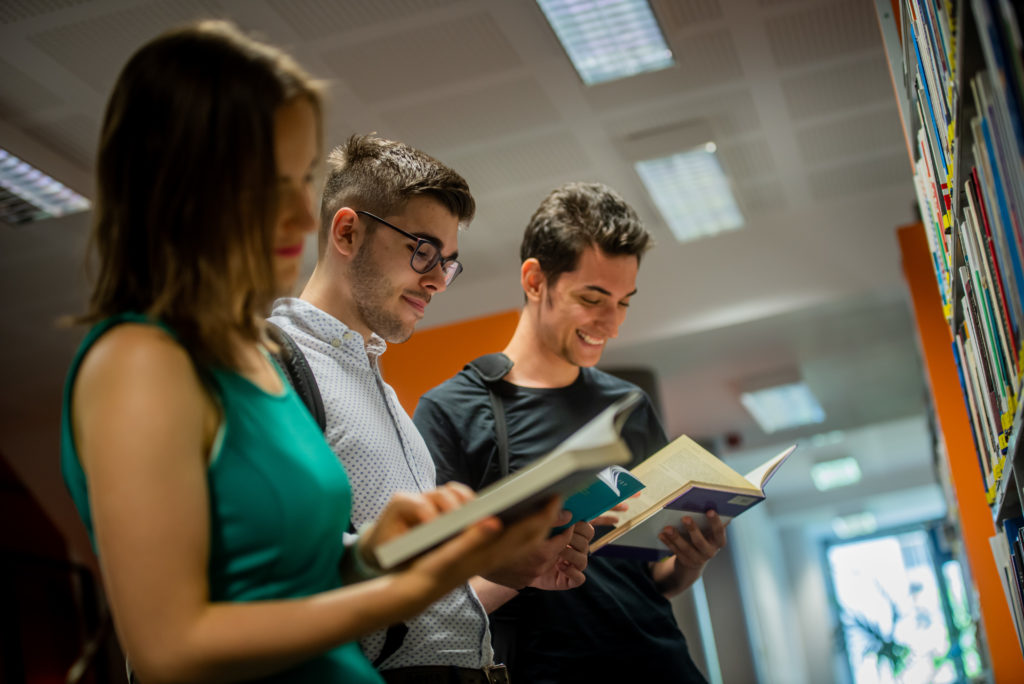What does the Corvinus Library offer this year?

We talked to the library’s director general Zsuzsanna Nagy and the head of the library’s reader service department Ildiko Sági about this year’s new features, rules and the first steps of the freshmen.
Author: Taxner Tünde
Both a quiet and conversational learning space
The idea that you have to tiptoe through libraries to find even the required reading material is a common one. But the Corvinus library is offering students a new option from September this year. “We also want to promote to students that one of the important functions of the library is to provide a learning space” – says the library’s director general Zsuzsanna Nagy. In addition to quiet spaces, they are also working to increase the number of spaces where groups can study.
This is what the consultation rooms are for, five of which are currently operational. They can be booked for at least three people via this online platform. Each room is equipped with a television and a whiteboard, so you can prepare presentations together.
Information about the library is available on the central website, where databases and training courses are updated. The library sub-page is most easily accessed by clicking on the book icon in the top left-hand corner of the home page.
“It is a very pleasant environment that students like, but the five rooms are insufficient” – says Ildikó Sági. That is why from September this year, the Business Studies Reading Room, i.e. the second floor, will be a shared learning space. A screened area, separated by blocks, is under construction. The furniture will soon be rearranged to allow learning in small groups.
For now, the first floor reading room and the journal reading room are designated for quiet study. The large reading room on the second floor will be the discussion and shared learning space” – says Zsuzsanna Nagy. Ildikó Sági added: “You can have discussions, but without disturbing each other’s work. We trust in the students’ self-regulation to be respectful of each other.
Another new feature is that the glass-walled Aquarium room has been returned to the library. Library programmes and training courses will be held there, and student organisations can also use it for events. Basically, they can host events for students, which should be arranged by e-mail with the library.
Current epidemiological measures and opening hours:
– wearing a mask: not compulsory, but recommended
– keeping distance: recommended, seating is arranged accordingly
– students are welcome throughout opening hours:
– Monday to Friday: 8:00-21:00
– Saturday 10:00-16:00
– extended opening hours during the examination period: will not close Saturday afternoon
Online and in-person courses
“In addition to the traditional library activities, there are two main areas of work for librarians: one is to support learning and education, and the other is to support research” – the library’s director general told us last year, and this still applies today. In addition to providing borrowing services and a learning space, the library also provides courses for students at all levels of education, from freshmen to senior students, and even teachers. The trainings will be held in person or online depending on the epidemiological situation. The trainings are currently being held in a hybrid system.
Small group training sessions may be followed by face-to-face consultations. Information on current courses is available under the Writing Center menu item. Many people approach them looking for “that big blue book”, so they also want to help freshmen find their way. For example, with these courses:
- “To Google or not to Google” – search by topic
- “This is how you write” – tips for writing your submission
- “Ctrl c – Ctrl v”: On citations, plagiarism
Freshmen can come to the library any time during opening hours to register. They are automatically registered in the system, so they only need to show a document proving their identity, and their cards are printed on the spot. The card must then be shown each time they enter the library. The card fee is HUF 1,000, payable via Neptun. The library issues the payment request within a week or so.
Cash payments are no longer allowed at the library, and late fees must also be settled via Neptune. Card payment is available for outsiders.
The library has a self-service borrowing service, with terminals for both returning and borrowing books. However, if you are in a hurry or the library is not open, you can drop your book in the box outside the library. In this case, the book will not be automatically removed from your name immediately, only after the librarians have emptied the box.
Continuously updated databases
The library allows university citizens to search several international and national databases either locally in the computer rooms or from home via a VPN connection.
“A major new addition is the international company database ORBIS” – says Zsuzsanna Nagy. Another big step forward is that you can now access the database of the Institute of Economics at Corvinus. Other databases at the university were also compiled. “We developed this because there were subscriptions scattered in departments and institutions that the university community did not know about”. Zsuzsanna Nagy said that their aim was to compile everything and that the purchases should be made more centrally, at university level.
All the databases can be found on the website, but you can search not just one at a time, but several at once: that is what the super search is for. There are also trial accesses, with the Oxford and Financial Times databases currently being tested. “We are not subscribed to these, but companies provide a trial period for institutions to try them out. Ideally, decisions are made on the basis of the usage statistics” – says the director general.